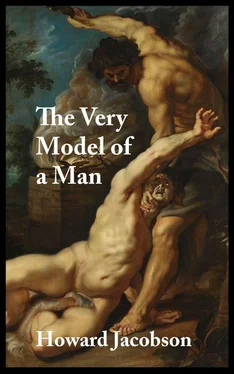He didn’t reply. Suddenly he wanted to be alone with his thoughts again. We sat a little longer, watching the granite beneath our feet change from grey to purple to red to brown, then we made our way down the mountain in silence.
From time to time I thought I heard strange noises coming from the rocks, and once actually ran off in pursuit of a sound that put me in mind of a new disgusting creature that He had visited on us — a creeping, hobbling half dog, half cat-like thing that secreted sticky fluids as it moved, seemed to be of both sexes simultaneously, and preferred offal to all other foods. Another of God’s tricks to please my mother? I had given it the name hyena, in imitation of its laughter, and it was a hyena which I thought I heard. But I was wrong. When I reached the place from which derision had seemed to emanate, it was empty. When I put my ear to the stones that had seemed to sing and whistle, they were mute.
The moment we reached level ground it began to rain. A brief sporadic pitter-pattering at first, followed by a heavier, more rhythmic fusillade, like the galloping of horses. Mysteriously, though, this was rain that was not wet. I looked up at the sky; a few courtier clouds, billowing pink, attended the dying of the sun. Immediately above us it was clear, in preparation for the ritual entrance of the stars. My hair was dry. The ground I trod on was dry. Yet rain hissed around me, squelched underfoot, gurgled among the rocks we had quit, parched just a few minutes earlier.
I turned to remark on this strange phenomenon to my father, who was dawdling behind me, too preoccupied, I supposed, to have registered with his own faculties that we were caught in an invisible downpour. He was smiling broadly, with his tongue out, pretending that he couldn’t get it back in again — a piece of nonsense that had a history between us, taking me back to my first childhood and our earliest collusion in mischief. Bleh! bleh! bleh! he used to say to me when he had scored some minor triumph over adversity or had got himself in and out of trouble with my mother. And I, lacking words, used to tongue it back: Bleh! bleh! bleh!
After all this time, and in the light of what we had been mulling over on the mountain, it was odd seeing him standing there with his eyebrows wild and his hands hanging and his tongue adrift, saying bleh! at me once more.
You’re looking pleased with yourself, I noted.
So I should be, he said. I fooled you, and you’re the clever one.
For a moment I wondered whether he meant that he’d been having me on all afternoon and was no more a jealous husband than he was a philosopher.
He watched me not understanding him. That gave him pleasure, too.
The rain, he said.
I said, there is no rain.
The rain you can hear, he said.
I listened. It’s stopped, I said.
He was more than pleased with himself; he was out of his skin with excitement. That’s because I’ve stopped, he said.
What do you have to do with the rain?
He came up close to me, dropped his tongue out and pointed to it. All in the mouth, he said. All in here. Tongue, teeth and air — that’s all you need. Do you want to hear thunder? Listen…
And sure enough, rumbling in from the very direction in which we were heading, from where the smell of holy excreta and gushing milk was already reaching us, I now could hear thunder.
Well? What do you think?
I said I thought it remarkable.
So much for weather, he said. Nothing to it. Tricks? I’ll show him tricks!
And before we were home he had done a cloudburst, a river in full flood, a gale howling unimpeded across the waste howling wilderness, a thin oozing thistle wind, the bark unpeeling from a Tabor oak, locusts in flight, duck fat spitting in a fire, a crocodile devouring our new enemy the hyena, and, in his lowest voice, for just the two of us, the Lord God making up to Eve on a quivering breeze.
But it was not until the next day, when I saw him fashioning a clay doll, a puppet, a marionette, a dummy, a golem in the image of himself, which it was his intention to sit upon his knee and animate — actually produce sound and personality and opinion and, who could say, maybe even rebellion from — that I realised my father’s campaign to win back my mother in fair and open combat had begun in earnest.
Now Korah, the son of Izhar, the son of Kohath, the son of Levi, the son of Jacob…
Jacob?
Sisobk the Scryer pounds his temples with the heels of his little hands. He has been reading the Old Testament in his room all morning, descrying scripture in the steam that rises from the jorum of frothing water he grips between his knees, but he cannot get to Korah for the knot of roots, the rotting bark and dead wood, that chokes Korah’s ancestral tree. Jacob? What is Jacob, the ankle-grabber, the thief of his brother Esau’s birthright, doing here? Sisobk knows Korah’s story better than he knows his own, and never until now has the name of Jacob figured in it.
The future is not something Sisobk is prepared to play fast and loose with. You can’t have people slipping in and out of it at will. Hence his resorting to that unnatural expedient, that aide-mémoire of second-rate diviners — steam. He means to clear the blockage in his faculties.
A thin moustache trails across his lip like a lost platoon of ants. This he traces with two fingers, as though its presence is a surprise, or perhaps a disappointment, to him. Then he pinches his nostrils, compresses his tiny eyes until they squelch like raisins, lowers his red perspiring head into the fumes, and tries once more to turn the pages of the Book of Numbers.
NOW Korah…
His mind lurches, slides, stumbles, scalds — so much ash wheezed up from the bronchitic chest of a volcano. Korah to Levi, Levi back to Izhar, Izhar on to Kohath, from Kohath back to… But it’s no use. Again it all unravels with the unauthorised intrusion of Jacob, the smooth one.
Sisobk the Scryer changes his names to Iykhernofret the Ineffective, and wishes it were as easy to change Jacob’s. It is not only that his prophet’s pride is hurt. He is also thwarted as a reader. He has been looking forward all week to spending the day with Korah, steeling himself in his steel, rebelling in his rebellion; but he cannot proceed with the narrative when a name that decidedly isn’t on the page refuses to dislodge itself from his brain. ‘Nothing ever sticks in my mind,’ he complains, ‘so why suddenly should Jacob?’
Let us intervene here and help Sisobk out.
It’s true we do not possess his gifts of prescience, but do we need them? We have scholarship on our side, hindsight, carbon-dating, computers, universities. Poor Sisobk is hardly a match for us, with just cuneiform and inspiration to call on. And as for the parcels of papyrus he wears tied around his feet instead of sandals, the as yet uninscribed codices and still-to-be erased palimpsests he shuffles along the streets in like a vagabond — why, a single pin-head of technology is sufficient space for us to store those and the entire intellectual footwear of the ancient world besides.
Let’s put Sisobk out of his misery, then, and tell him some of the things that we know. As for example that Jacob was indeed the great-great-grandfather of Korah, but chose to absent himself from the catalogue, as protection against the disrepute into which his great-great-grandson would bring the family name. Smelling the fruit — for he too was a breather-in of steam, this Jacob, he too was a hot-mountain slitherer and soothsayer — he sought to sever the branch. This is the meaning of the curse he delivered on his death-bed to his sons Simeon and Levi: ‘O my soul, come not thou into their secret; unto their assembly, mine honour, be not thou united.’
Читать дальше











